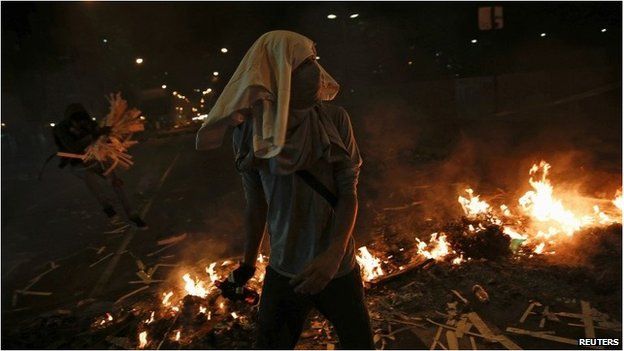Venezuela threatens to expel CNN over protest coverage
- Published

Venezuela's President Nicolas Maduro has threatened to expel the US news network CNN from the country over its reporting of recent protests there.
Mr Maduro said he would take action if CNN did not "rectify its coverage".
Earlier, Mr Maduro said he was sending troops to the western state of Tachira, where there has been continuing unrest.
With tensions running high, the leader of the opposition, Henrique Capriles, has called for a fresh, peaceful anti-government march on Saturday.
There were reports of further clashes in the state of Tachira and in districts of the capital, Caracas.
At a news conference, Mr Capriles rejected violence and said he was ready for dialogue, but claimed the government was not willing to listen.
"In this turbulent hour, we call on the students and on those on the streets not to fall into the trap of violence," Mr Capriles said before showing several videos allegedly containing evidence of abuses by the security forces.
'War propaganda'
On national television, President Maduro accused his opponents of promoting violence.
He vowed to take the perpetrators of attacks against the Caracas metro, who were allegedly also caught on video, to court.
Mr Maduro also lashed out against the coverage of the protests by foreign news organisations.
"Enough war propaganda, I won't accept war propaganda against Venezuela. If they don't rectify themselves, out of Venezuela, CNN, out," he said.
A spokeswoman for the US network, only available on cable in Venezuela, told the BBC it did not have any immediate comments about Mr Maduro's comments.
Last week, the government removed Colombian TV news channel NTN24 from channels offered by Venezuelan cable operators.
The government has been highly critical of international media coverage, while protesters say they are concerned with a lack of media freedom, says the BBC's correspondent in Caracas, Irene Caselli.
Mr Maduro also ordered the expulsion of three US diplomats this week.
US President Barack Obama said the Venezuelan government should address "legitimate grievances" of the country instead of "making up false accusations" against US officials.
Earlier on Thursday, a Venezuelan court ordered that detained opposition politician Leopoldo Lopez remain in custody pending further hearings.
Mr Lopez of the opposition Popular Will party handed himself over to the authorities on Tuesday.
The government is charging him with intentional arson, inciting violence, damage to public property and conspiracy.
It is not yet clear when the next hearing will take place.
President Maduro has called the opposition politician a "murderer" and alleged he is being paid the the US Central Intelligence Agency to topple his government.
The authorities point to Mr Lopez's participation in street protests in 2002 which preceded a brief coup against then President Hugo Chavez, Mr Maduro's predecessor in office and mentor, to back up their claims.
- Published6 August 2017
- Published29 December 2013